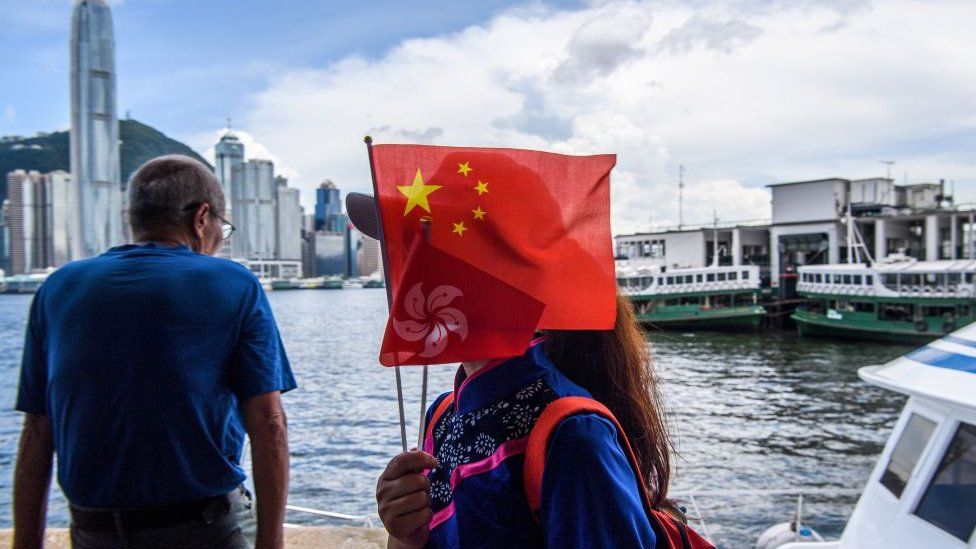Hong Kong: New school books claim territory was not a British colony
- Published

New textbooks for Hong Kong schools will state the territory was never a British colony, local media report.
Instead, the books declare the British "only exercised colonial rule" in Hong Kong - a distinction drawn to highlight China's claims of unbroken sovereignty.
China has always asserted it never gave up sovereignty and its surrender of Hong Kong to the British was due to unfair Opium War treaties in the 1800s.
The UK returned Hong Kong to China in 1997 after ruling for over 150 years.
During its rule, it referred to Hong Kong - a port with a deep harbour that grew into a booming city state, and one of the world's leading financial centres - as a colony, as well as a dependent territory.
The United Kingdom governed the area from 1841 to 1941, and from 1945 to 1997, after which it was handed back to China.
Encouraging a 'Chinese identity'
Jeff Li, BBC Chinese
China maintains Hong Kong has always been its territory - that the British only occupied it after 1842.
And while the Qing government at the time signed successive treaties ceding and leasing parts of the territory to Britain, China argues those were signed "under coercion" and never accepted them.
Hong Kong's government has been following Beijing's rhetoric since the 1997 handover. It never says sovereignty was "transferred" to China, but rather Hong Kong has "returned to the motherland".
Government museums used to describe Hong Kong as a "British colony", but those words were removed in 2020 - a move locals said was indicative of China's strengthening control in the semi-autonomous city.
The latest move is in line with Beijing's attempt in recent years to instil a "Chinese identity" among Hong Kong students - to sow the idea that Hong Kong has always been part of China, but was taken away for a period under British rule.
The new textbooks take pains to explain the differences between a colony and colonial rule - with the texts declaring that for a country to call an external territory a colony it needs to have sovereignty as well as governance over the area.
In the case of Hong Kong, the British "only exercised colonial rule… so Hong Kong is not a British colony", the textbooks say, according to local media reports.
The books have been drawn up for a specific course to be taught in Hong Kong schools focusing on citizenship ideals, lawfulness and patriotism.
The subject replaces a liberal studies course that sought to teach students greater critical thinking skills and ideas on civic engagement.
Chinese authorities directly criticised this course during the city's mass pro-democracy protests in 2019, saying such education had "radicalised" young people and given them the wrong ideas.
The new textbooks - which have yet to printed, and are pending final approval by Chinese authorities, local media say - also reflect Beijing's characterisation of the mass pro-democracy protests in 2019 as a security threat.
The South China Morning Post reported one excerpt on the protests reading: "Secession and subversion against the government were advocated in some of those activities posting a threat to national sovereignty, security and interests."
While incidents of violence did occur during the 2019 protests, the majority of protests were largely peaceful. Human rights groups have also raised accusations of police brutality and mistreatment of peaceful protesters during the period.
Timothy Lee, a former Hong Kong pro-democracy lawmaker who is now exiled from the territory, was among critics expressing concerns about a "rewriting" of history.
Allow Twitter content?
This article contains content provided by Twitter. We ask for your permission before anything is loaded, as they may be using cookies and other technologies. You may want to read Twitter’s cookie policy, external and privacy policy, external before accepting. To view this content choose ‘accept and continue’.
What's happened since handover?
After the handover in 1997, China's Communist rulers classified the city as a special administrative region with its own governing and economic system, allowing individuals more freedoms than on the mainland.
Following the major 2019 protests, China cracked down on civil freedoms formerly allowed in Hong Kong.
- Published19 March
- Published28 April 2022
- Published8 April 2021